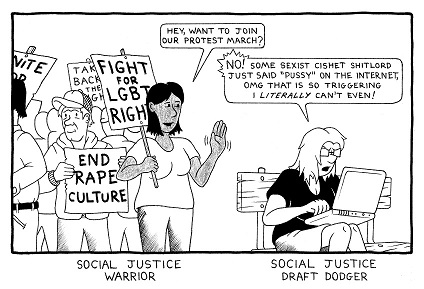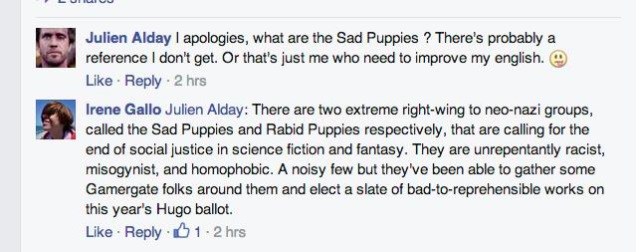I’m always leery of arguments like this, that want to dismiss the different axises of oppression various groups of people struggle with in favour of some vulgar marxist idea of the working class and not asking too many questions. Too often this has been used by alter kakkers to just dismiss any struggle that doesn’t fit in their century and a half old ossified world view:
Where people on the left should be focussed on what unites us, us here referring to the working class rather than the left in general (lol, as if that’s going to happen), as workers -the foundations from which we can build the new society- we now see attempts to stratify through definition the working class under the guise of intersectional analysis. An intersectional analysis is a useful tool to have in one’s box if one is studying Sociology or writing academic papers but in the real world it doesn’t translate well, not well at all. In fact one of the reasons that I began my abstention from generalised political activity was the emergence of this approach -along with the increasing popularity of privilege politics- as I saw early on that the praxis that would develop from this approach would inevitably see a return to the embarrassing ‘hierarchy of oppressions’ which permeated the radical politics of the 1970s/80s (before my time -I’m not that old!).
He may not be that old, but his criticisms are. There’s always been a tension within socialism about how to define the struggle. Rightwing socialists tend to define it narrowly, purely as the struggle of the working classes against the bourgeois and anything that isn’t directly related to that struggle as a distraction. Depending on the decade — or century — you’re talking about this could mean feminism, civil rights, gay rights, or today, intersectionality and online activism.
The leftwing has always defined the struggle much more broadly. There’s a long and proud tradition within socialism and communism of not just fighting for the rights of (white) working men, but also recognised from the start that you can’t build a classless society when half the population is still powerless because of their gender, that it’s immoral to let the welfare of the British worker depend on the continuing exploitation of the Indian worker. So there’s always been a strain in socialism that defined the struggle much broader than just defending workers’ rights, that strived for an utopia for all people.
That is intersectionality pur sang and the thing about it is that it works both ways. There’s always a tendency to assume that these causes always distract from your own, much more worthy and important one, but intersectionality also gets you allies. That’s what happened in 1984 when at the height of AIDS paranoia stoked homophobia a group of London gay men and lesbians reached out and supported the South Wales Miners Strike:
Both groups were canny enough to understand that they struggled against the same oppression. The gay and lesbian activists recognised the police violence and oppression the miners were subjected to from their own experiences with them and believed in solidarity enough to not just recognise it, but take action. And the miners reprociated, send delegations to Gay Pride, supported them in their struggle. It was of course mocked by the establishment — now the perverts support the pits, as The Sun put it.
But you might say, gay liberation, strikes, those are real political actions, real causes, not frivolity like what I’m talking about, but that was far from the mainstream view back in 1984. So many socialists for so long saw homosexuality as a capitalist perversion, not as part of their struggle, not something that could be easily portrayed in terms of class struggle. And that’s why this bloody cartoon included in the post annoys me so much:

Not just because it’s a lazy cheap shot and doesn’t understand that in 2015 it’s really hasn’t been possible for at least a decade to pretend that that online space is less important than offline spaces. No, it’s because I’m old enough to know that all the examples of worthy causes given here –take back the night, ending rape culture, lgbt rights — would have been ridiculed and dismissed as fauxtivism and middle class vanities not too long ago. It’s breathtakingly ignorant.
Now AW Hendry started his post by mocking the Sad Puppies, which is how I stumbled upon it, thanks to Mike Glyer’s sterling work rounding up Puppy related material. He used it as his example of how people waste time with online activism and throughout his piece the unspoken assumption is made that online doesn’t matter and economic considerations should be much more important than cultural fights like this. What this misses is that, even apart from the simple fact that quite a few of us now live our lives as much online as in the real world, online follows you home — ask Zoe Quinn or any other SWATting victim. What he also misses is that the struggle over the Hugos is more than just the misplaced vanity of a few rightwing culture warriors: as Kameron Hurley explained, the Hugos meant she got $13,000 more in her post-Hugo book advance.
Not the highest of stakes perhaps, but for your average struggling writer that is a large chunk of money. I also have the suspicion for at least some of the ringleaders, this kerfuffle is a way to help themselves to some of that sweet, sweet wingnut welfare. People like Tom Krautman or Dave Freer may seem dangerously unhinged to normal people, but they’d fit in well with Vox Day’s old haunt, Worldnet Daily. Voxy himself of course is trying to establish his vanity press as a serious rightwing proposition and arguably does all this for the publicity. Which means for him at least it’s not the winning that’s important, it’s keeping the fight going, the better to keep fleecing suckers.

